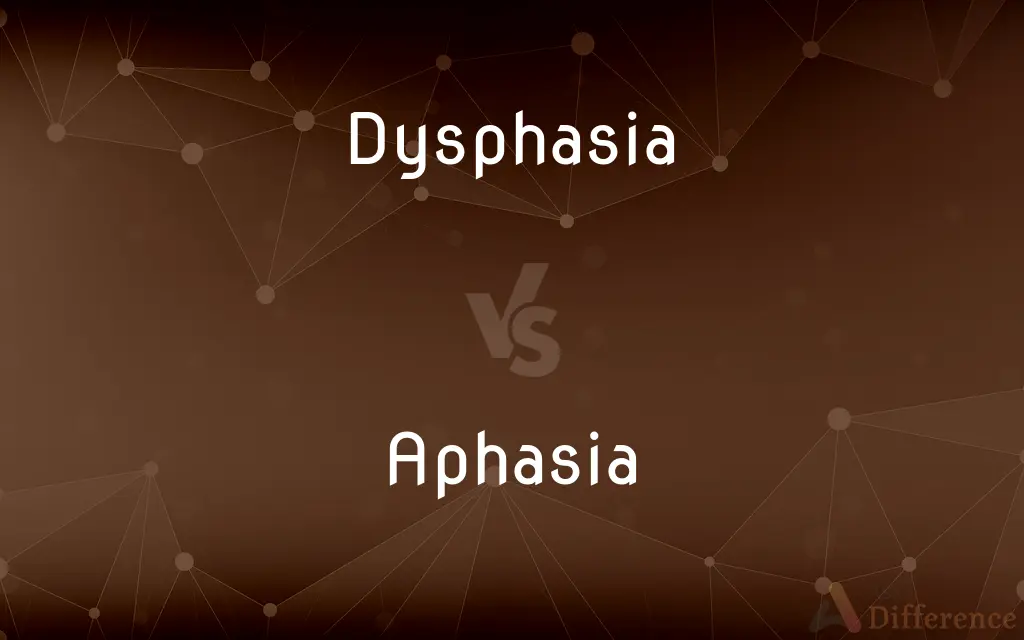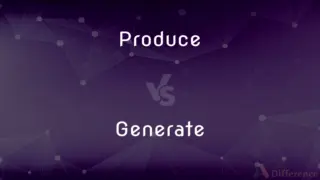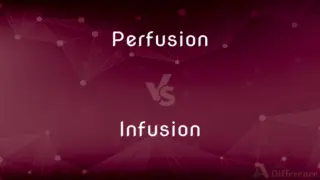Dysphasia vs. Aphasia — What's the Difference?
By Urooj Arif & Fiza Rafique — Updated on April 1, 2024
Dysphasia involves difficulty with language comprehension or expression, while aphasia refers to a more severe loss of the ability to understand or express language.

Difference Between Dysphasia and Aphasia
Table of Contents
ADVERTISEMENT
Key Differences
Dysphasia is characterized by partial loss of the ability to communicate or comprehend words, which might manifest as trouble finding the right words, forming sentences, or understanding speech. This condition suggests that the individual retains some level of language function, but encounters significant challenges. In contrast, aphasia describes a more extensive impairment or total loss of language skills, often resulting from brain damage. Individuals with aphasia may be unable to speak, understand speech, read, or write, indicating a profound disruption in communication abilities.
The term dysphasia is often used interchangeably with aphasia in many contexts, yet it traditionally denotes a milder form of language impairment. Patients with dysphasia might experience frustration or embarrassment due to their language difficulties, but they can sometimes manage to communicate through modified language use or alternative communication strategies. Whereas, those with aphasia face more substantial barriers to communication, which can lead to significant social isolation and a need for comprehensive speech and language therapy.
Dysphasia might manifest in specific aspects of language, such as naming objects (anomia), understanding spoken words (auditory verbal agnosia), or assembling sentences with correct grammar (agrammatism). These difficulties highlight the partial nature of the impairment. On the other hand, aphasia can encompass all these challenges to a more severe degree, often requiring individuals to relearn basic language skills from scratch.
In terms of recovery and treatment, individuals with dysphasia may show more rapid improvement or have a greater potential for regaining their previous level of language function, especially with timely and targeted speech therapy. Aphasia, given its severity, typically demands a longer-term, more intensive rehabilitation process, with varying degrees of success depending on the extent of brain damage and the individual's response to therapy.
Intervention strategies for dysphasia often focus on strengthening existing language abilities and finding compensatory techniques for communication. These might include using visual aids, gestures, or technology-supported communication tools. For aphasia, interventions can also include these strategies but might additionally involve retraining the brain in basic language functions, utilizing more diverse and intensive therapies to stimulate language comprehension and production.
ADVERTISEMENT
Comparison Chart
Severity
Partial loss of language abilities
More severe or complete loss of language abilities
Communication Impact
Difficulty with language comprehension or expression
Severe difficulty or inability to understand or express language
Symptoms
Trouble finding words, forming sentences, understanding speech
Inability to speak, understand speech, read, or write
Treatment & Recovery
Potential for significant recovery, especially with early therapy
Longer, more intensive rehabilitation process; varied outcomes
Intervention Strategies
Use of alternative communication strategies, speech therapy
Intensive speech and language therapy, relearning language skills
Compare with Definitions
Dysphasia
Partial difficulty in speaking or understanding language.
She has dysphasia and often finds it hard to find the right words.
Aphasia
Severe difficulty with language after brain injury.
His aphasia is so severe that he cannot form any understandable words.
Dysphasia
Mild impairment in language expression or comprehension.
After his stroke, he experienced dysphasia, making conversations challenging.
Aphasia
A condition marked by lost or impaired ability to communicate.
After the accident, aphasia left her unable to speak.
Dysphasia
Difficulty with verbal communication, but not complete loss.
Despite his dysphasia, he can still communicate basic needs.
Aphasia
Inability to understand or express speech, often due to stroke.
Aphasia has made it impossible for him to read or write.
Dysphasia
Challenge in forming sentences and using words correctly.
Dysphasia makes it difficult for her to construct long sentences.
Aphasia
Complete or near-complete loss of linguistic abilities.
She's learning sign language to communicate due to her aphasia.
Dysphasia
A condition affecting the ability to process language.
Dysphasia requires specialized speech therapy for improvement.
Aphasia
A neurological condition affecting speech and understanding.
Intensive therapy is helping her recover from aphasia slowly.
Dysphasia
Impairment of speech and verbal comprehension, especially when associated with brain injury.
Aphasia
Aphasia is an inability to comprehend or formulate language because of damage to specific brain regions. The major causes are a cerebral vascular accident (stroke) or head trauma.
Dysphasia
(pathology) Loss of or deficiency in the power to use or understand language as a result of injury or disease of the brain.
Aphasia
Inability (or impaired ability) to understand or produce speech, as a result of brain damage.
Aphasia
Partial or total loss of the ability to articulate ideas or comprehend spoken or written language, resulting from damage to the brain from injury or disease.
Aphasia
(pathology) A partial or total loss of language skills due to brain damage. Usually, damage to the left perisylvian region, including Broca's area and Wernicke's area, causes aphasia.
Aphasia
Loss of the power of speech, or of the appropriate use of words, the vocal organs remaining intact, and the intelligence being preserved. It is dependent on injury or disease of the brain.
Aphasia
Inability to use or understand language (spoken or written) because of a brain lesion
Common Curiosities
Is recovery from aphasia possible?
Recovery from aphasia is possible to varying degrees, depending on the extent of the brain damage, the individual's condition before the injury, and the effectiveness of speech and language therapy.
How are dysphasia and aphasia diagnosed?
They are diagnosed through a combination of medical evaluations, including neurological assessments, imaging tests, and speech-language evaluations to determine the extent of language impairment.
What is the main difference between dysphasia and aphasia?
The main difference lies in the severity of the condition; dysphasia is a partial or mild form of language impairment, whereas aphasia is a more severe or complete loss of language ability.
What are the treatments for dysphasia and aphasia?
Treatments include speech and language therapy, utilizing strategies tailored to the individual's specific language challenges, and may involve alternative communication methods and technologies.
What causes dysphasia and aphasia?
Both conditions are typically caused by brain damage due to stroke, traumatic brain injury, or other neurological conditions.
How do dysphasia and aphasia affect daily life?
Both conditions significantly impact communication, social interactions, and quality of life, making everyday tasks and personal relationships more challenging.
Can children have dysphasia or aphasia?
Yes, children can develop these conditions, often due to congenital abnormalities, early brain damage, or severe developmental disorders, requiring early intervention and specialized education plans.
What support is available for people with dysphasia or aphasia?
Support ranges from medical and therapeutic interventions to community resources, support groups, and educational materials to assist both individuals and their families.
Can dysphasia turn into aphasia?
While dysphasia and aphasia are often used interchangeably, dysphasia doesn't "turn into" aphasia; rather, the terms reflect different degrees of language impairment severity.
What role do family members play in the recovery from dysphasia and aphasia?
Family members play a crucial role in recovery by providing emotional support, practicing communication strategies learned in therapy, and helping to create a supportive environment that encourages the use of language and alternative communication methods.
Do dysphasia and aphasia only affect spoken language?
No, these conditions can affect all forms of language, including spoken, written, and sign language. They impact the ability to communicate across any language modality, not just speech.
Are there any preventive measures for dysphasia and aphasia?
While it's not always possible to prevent these conditions, maintaining overall brain health through a healthy lifestyle, managing risk factors for stroke and heart disease, and regular cognitive activities can reduce the risk.
Can technology aid in the treatment of dysphasia and aphasia?
Yes, various technological tools, including speech-generating devices, apps for language learning, and computer-assisted speech therapy, can significantly aid in the treatment and daily communication of individuals with dysphasia and aphasia.
How long does it take to see improvement in dysphasia and aphasia?
The time to improvement varies widely among individuals; some may see progress within weeks or months, while others may take years. The rate of improvement often slows down over time, but significant gains can be made, especially with early and consistent therapy.
Share Your Discovery

Previous Comparison
Produce vs. Generate
Next Comparison
Perfusion vs. InfusionAuthor Spotlight
Written by
Urooj ArifUrooj is a skilled content writer at Ask Difference, known for her exceptional ability to simplify complex topics into engaging and informative content. With a passion for research and a flair for clear, concise writing, she consistently delivers articles that resonate with our diverse audience.
Co-written by
Fiza RafiqueFiza Rafique is a skilled content writer at AskDifference.com, where she meticulously refines and enhances written pieces. Drawing from her vast editorial expertise, Fiza ensures clarity, accuracy, and precision in every article. Passionate about language, she continually seeks to elevate the quality of content for readers worldwide.
















































